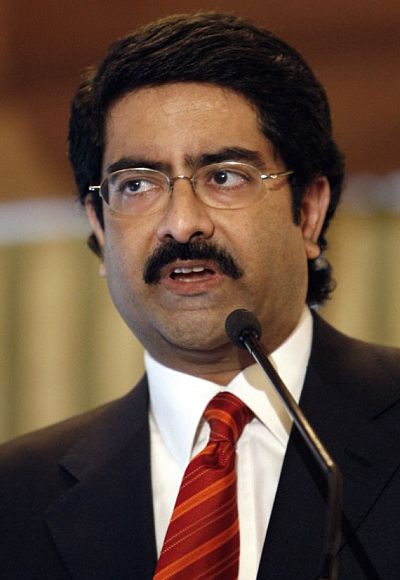
For a company that has grown its business and gained market share through acquisition, regulatory delays could play spoilsport.
Last month, Idea Cellular Chairman Kumar Mangalam Birla had sought “urgent personal intervention” of Union Telecom Minister Kapil Sibal on a number of issues.
These included allocation of 3G spectrum in Punjab, transfer of the licences of Spice Telecom which it had acquired in 2008, award of the spectrum won in November 2012 and adjustment of fees paid by Spice.
Most of Idea’s regulatory hurdles stem from the acquisition of Spice Telecom.
While the company says that the mobile permits of Spice have not been transferred to it despite several court rulings, the department of telecom’s (DoT) contention has been that licence conditions have not been met for it to give the go ahead for the merger.
The matter is now in TDSAT’s (Telecom Dispute Settlement and Appellate Tribunal) court.
...

While DoT has its reservations about the transfer, analysts believe that the company has a strong case and that the approvals are likely to come. “Given that the courts have given their approval, there is no reason why the merger and the transfer of licences should not be approved. It is more of a procedural issue and should come through,” says an analyst.
Himanshu Kapania, the company’s managing director, in a investor con-call has said that he is confident on the twin issues of transfer of Spice’s Unified Access Service (UAS) licence to Idea as well as the go-ahead for commercial use of 3G spectrum in Punjab.
However, even if the company were to get the approval and the merger issue was sorted out, it would have a lot of ground to cover in order to attract subscribers. Further, with other companies getting a headstart over Idea, telecom experts such as Benoy CS, director (information & communication technologies practice), Frost & Sullivan, believe that the impact of the delay will be both operational and financial.
“You lose the first mover's advantage and are forced to play catch up if there is a delay in the launch. As a consequence, overall expenditure, especially on marketing, goes up. The second impact is on investments, in rolling out of the network infrastructure, which is likely to be underutilised, given that the service is not operational.”
...

The company had paid Rs 322 crore for 3G spectrum in Punjab. The other winners for the circle were Reliance Telecom, Tata Teleservices and Aircel. The investments have an associated interest and depreciation cost that the company has to bear without getting anything in return.
Given the circumstances, analysts say the only comfort for Idea comes from the fact that demand for 3G services is still to pick up. “It could lose out more if consumer preference for 3G services takes off in a big way,” says a telecom analyst with a leading foreign brokerage.
The company’s 3G subscriber base has doubled to 5.1 million users over the last one year, while its overall user base during this period has grown 8.5 per cent to 121.6 million. Punjab is an important market for the company; with a revenue market share of nearly 21 per cent, it is the number two player in that market. In addition to Punjab, the company is also awaiting the verdict on 3G intra-circle roaming issue.
...

The other issue facing the company is with regard to the Rs 484 crore (Rs 4.84 billion) paid by Spice as entry fee. Idea had won spectrum for seven circles in the September 2012 auctions for Rs 2,031 crore (Rs 20.31 billion). According to rules, the Rs 1,168 crore (Rs 11.68 billion) it had paid for spectrum when A Raja was the telecom minister could be set off against this amount.
However, the company only got permission to set off Rs 685 crore (Rs 6.85 billion). The balance amount accruing from the Spice licences is still under dispute.
Analysts say if the company loses the money, its short-term finances could be hit. “This will have a short-term impact for the company and could have a bearing on the stock price,” says an analyst.
While the company is struggling on numerous counts, the main concern for the Street continues to be spectrum-related regulatory impact. Says Jaideep Ghosh, partner, KPMG, “In terms of financial outflow, the key regulatory issues facing leading players (including Idea) is the upcoming spectrum auction, one-time fee and spectrum refarming.”
...

A lot of questions related to spectrum pricing, refarming and the terms of the renewal of licences are left hanging. Analysts have pegged a one-time spectrum charge and licence renewal fee at Rs 40 per share for Idea.
Some of them believe that licence renewal, beginning from FY14, will impact Bharti Airtel and Vodafone more compared to Idea. The company has seven licences which are up for renewal in December 2015.
However, the good news for idea is that these regulatory uncertainties have so far not impacted its operations or its stock price. In the March quarter, the company gained incremental market share at the cost of smaller players.
Idea increased its overall market share to 15.7 per cent at the end of March quarter from 14.8 per cent in the December quarter. Its share of the incremental market is pegged at 24.5 per cent.
...

“On the back of aggressive marketing and tariff strategy and expanding presence in emerging circles, Idea has managed to increase its revenue market share smartly in the last three years. We expect Idea to continue to leverage upon its strong presence in high growth rural markets and increase in data penetration to gain revenue market share,” say Abhishek Singhal and Kumar Saurabh of Macquarie Capital Securities India.
The company’s stock over the last six months has been up 40 per cent even as the Sensex rose only 10 per cent in the period.
HSBC Securities and Capital Markets analysts Rajiv Sharma and Tucker Grinnan say that the stock outperformance has been driven by robust execution, revenue market share gains, gradual improvement in the regulatory environment and lower exposure versus peers such as Bharti Airtel and Reliance Communications to forex volatility.